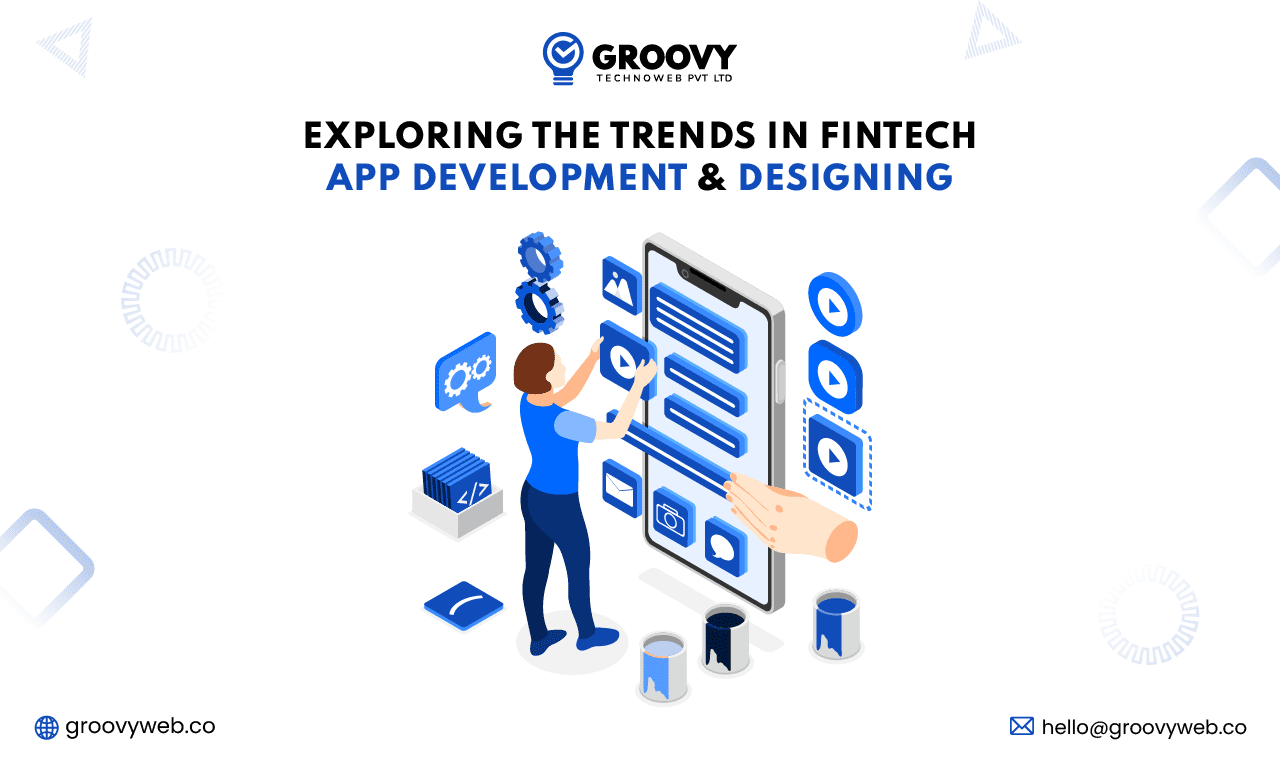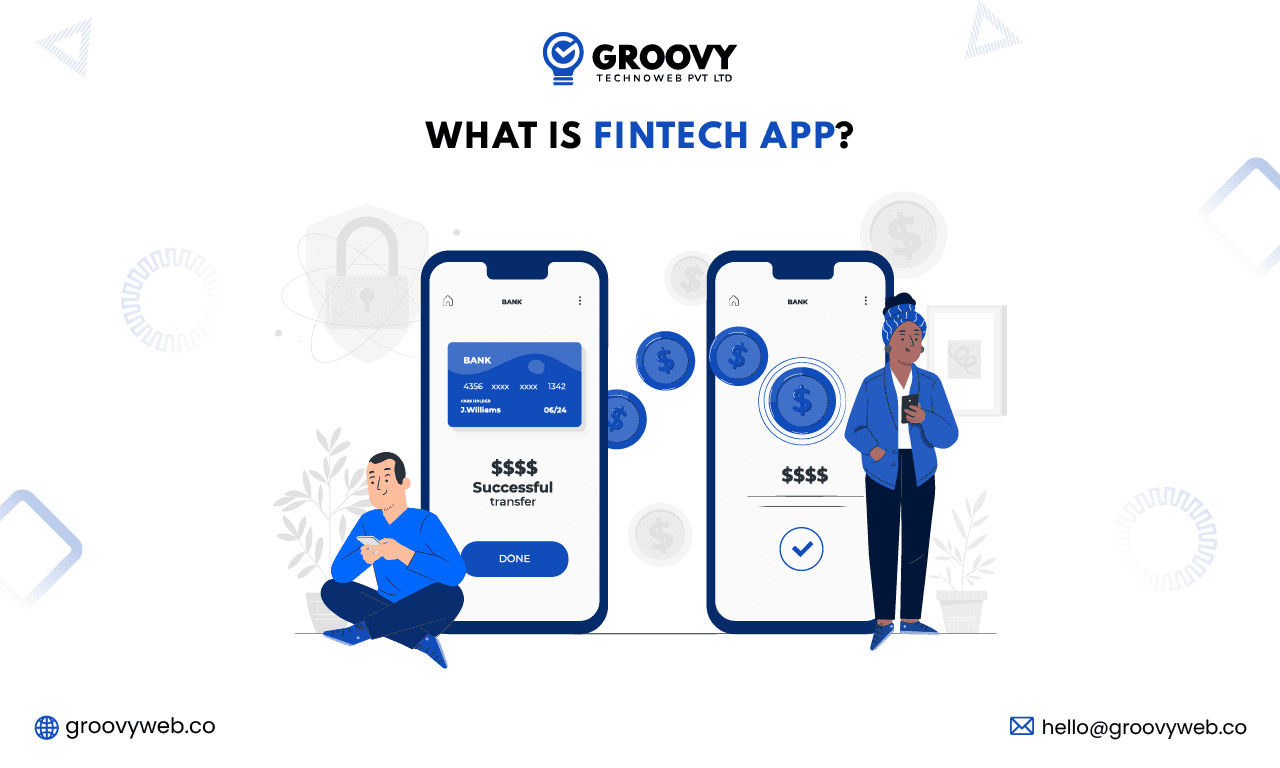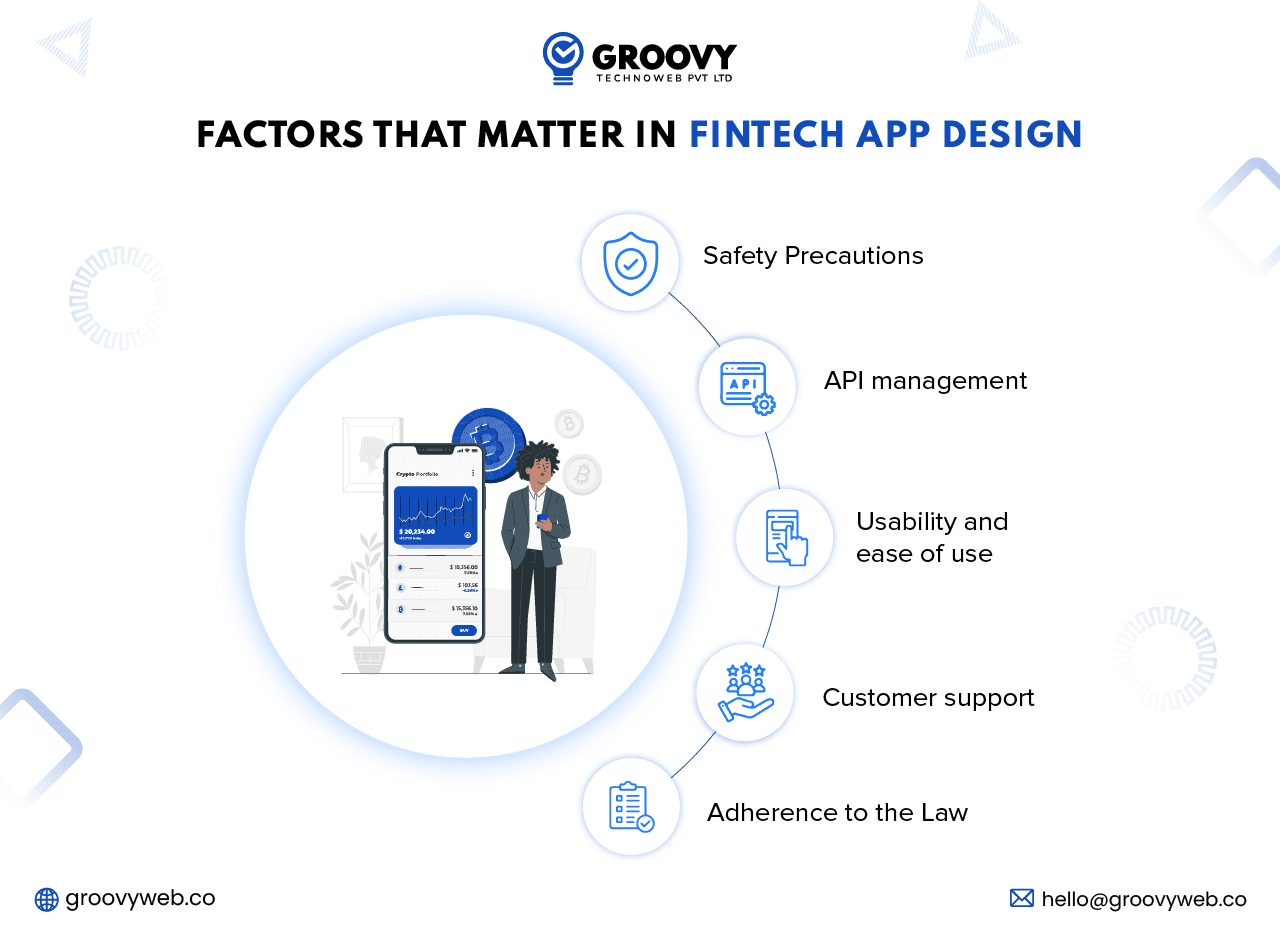Exploring the Trends in Fintech App Development & Designing
Nauman Pathan
March 09, 2023 1745 Views
Quick Summary : The use of AI and machine learning for personalised financial services, the incorporation of blockchain technology for improved security and data sharing, the emphasis on user experience and design, and the emergence of neobanks as a well-liked substitute for conventional banks are some of the most recent trends in fintech app development.
Financial technology, also known as FinTech, is undergoing rapid growth and improvement. Improvements in this field are presumed to make it easier for banks, financial institutions, and their customers to avoid wasteful spending, deal with risks, and manage their finances. Across the board, businesses have shown a strong preference for using FinTech solutions. It is staggering that the FinTech market will balloon to $324 billion by 2024. (Market Data Forecast).
Therefore, it is easy to see why companies are keen on FinTech app development to build trustworthy Finance applications with a high level of security. This allows them to enhance the financial services and infrastructure they already have. FinTech app developers benefit more from creating a mobile app because they can reach a wider audience.
Developing specialized FinTech services and products, such as Reg-tech, insure-tech, and Robo-advising has been among the most valuable changes in the financial ecosystem. Before we dive into the most exciting FinTech developments of 2023, let’s take a moment to define the term.
What is Fintech App?
FinTech, short for “financial technology,” refers to the convergence of financial services and information technology to improve the delivery of financial products and services to consumers. Ecommerce, biometrics, AI, Block chain, and other technologies help make this possible.

Unlike popular belief, FinTech does not refer to a specific company or product. As an alternative, it’s a catch-all phrase for any number of developments in financial technology. FinTech allows for more efficient and convenient banking. Each one, or a combination, can improve a company’s efficiency and facilitate better communication with its staff, customers, and vendors.
Simply put, a FinTech application is a mobile app that grants users access to financial services from the comfort of their mobile devices. Also, the processes performed by these apps are more streamlined than those of conventional digital finance solutions.
Finance firms frequently seek out a top FinTech app development company to help them digitally transform their operations. Because of this, the company has boosted its productivity, offerings, and standing in the market.
From the earliest days of automated teller machines and online banking technology, fintech has been present. But with the advent of smartphones, that all changed dramatically. There has been an upsurge in “FinTech” firms that use FinTech app development services to compete with traditional banks.
Factors That Matter in Fintech App Design
When creating a financial technology app, businesses must consider some factors. Taking people’s money seriously is important because it’s a serious responsibility. The loss or mismanagement of someone else’s money can have severe repercussions, including jail time. Building a financial technology app that can compete in today’s market. Keep the following in mind as you design and build your fintech app.

Safety Precautions
When it comes to building a financial technology app, security is naturally of the utmost importance. Two-factor authentication, one-time password login, fingerprint security, and face recognition are all examples of features that could increase a user’s financial security. Avoiding security holes and keeping systems up-to-date through rigorous testing and maintenance will give you peace of mind.
API management
An integral part of building any fintech app is a well-managed API. It facilitates the interoperability of various applications and portals, thereby increasing the available functionality. You can integrate your app with a service like PayPal if you want to give your customers more payment options. Cooperate only with businesses that respect privacy and security regulations. Otherwise, your app may be affected unintentionally due to its vulnerability.
Usability and ease of use
Apps to help with personal finance and investment education are in high demand because of the complexity of the financial technology industry. Many of your target users may be immediately disqualified if your fintech app is overly complicated and requires in-depth knowledge of finances. That’s why it’s so important to make the experience of navigating your solution simple and enjoyable when designing a mobile app for a financial technology company. Create a welcoming environment by focusing on ease of use (unless your application is targeted towards finance gurus and complexity is justified and expected.)
Customer support
The development of fintech software should incorporate dependable and prompt customer service. A well-designed chatbot can assist user onboarding by providing straightforward responses to common questions. In addition, you should staff your customer service department with experts familiar enough with the product to answer even the most unusual questions.
Adherence to the Law
Making sure your fintech app complies with all applicable laws and regulations is a crucial first step in creating a successful product. When dealing with money, you must follow many rules and regulations. The Payment Card Industry Data Security Standard (PCI-DSS) is one such regulation that must be met. In addition, there are data privacy laws that must be followed by any company that gathers user data, such as the CCPA, GDPR, PIA, etc.
What are the latest trends in Fintech app development?
1. Artificial Intelligence and Machine Learning
With the help of past data, Artificial Intelligence technology has proven to be highly beneficial in providing accurate predictive analysis. As a bonus, this technology has already been used in many fields, including medicine, the arts, sports, and even industry.
Artificial intelligence is also widely used in the financial sector. Therefore, some of the most valuable analytical insights in the industry can be gleaned from big data. What’s more, AI is well-known for being the driving force behind automation in the banking sector.
The predictive analysis provided by this tool can help businesses save money and avoid harm. The user experience and safety of financial platforms can be enhanced by integrating technologies such as natural language processing chatbots and facial recognition systems. Since bank profits now exceed national incomes, it stands to reason that financial institutions will be among the first to implement AI. Presently, banking firms are honing their strategies for implementing AI solutions, which will contribute to AI’s growing popularity in the industry.
According to Autonomous research, by 2030, banks could save a total of $1 trillion in operating costs thanks to AI. Though, getting to this point of view can be challenging. Banking institutions need help finding qualified AI specialists like many other industries worldwide
AI’s ability to process unstructured data makes it a good fit for dealing with growing cybercrime incidents, including financial fraudulence.
The most effective service custom software uses smart systems, such as chatbots, powered by artificial intelligence. Financial technology companies will follow suit, making transactions faster and giving customers the practicality they seek.
2. Mobile Payment Integrations
PayPal, Alipay, Venmo, and Google Play are just a few examples of the many payment service providers that have emerged in recent years and completely altered the payment landscape and the user experience they provide. Additionally, the convenience of payment options is a major factor influencing a customer’s final decision to purchase.
The convenience of making payments will only increase as technologies like QR code, NFC payments, mobile wallets, the Internet of Things (IoT), and biometrics are adopted more widely. Businesses can improve the efficiency of their financial systems by providing customers with more flexible payment options. Many consumers and businesses are adapting to the convenience of contactless payment methods. All participants in the financial technology ecosystem, from entrepreneurs to institutional investors, stand to gain from the widespread adoption of contactless payment systems. To make purchases, more and more people are opting for cashless and contactless methods, and this trend is expected to continue for the foreseeable future.
App-based payment processing and the development of highly secure digital payment gateways made possible by fintech capabilities have the potential to alter the nature of our financial interactions significantly. Contactless payment methods are here to stay, and current applications such as tap and go on cards and scanner codes only scratch the surface of their potential.
3. Robotic Process Automation
As the term “industrial” suggests, this technology is finding use in many fields. Therefore, it can set the FinTech sector on its best course for the foreseeable future. Robotic process automation (RPA) is a technology that uses bots to automate boring, repetitive tasks that humans traditionally perform. Delegating tasks like data entry and processing to robots can help you save money and better use your staff’s time.
By hyper-automating tasks, RPA reduces the time it takes to switch between app features. Customers nowadays have a low tolerance for delays and a short attention span. Consequently, RPA can improve the efficiency and user experience of these apps. Fintech applications can benefit from a combination of RPA capabilities and cutting-edge software updates, which can be used to develop intuitive user interfaces and automated processes.
There is often a great deal of pressure on banks and other financial institutions to maintain normal business operations. Implementing RPA would undoubtedly render procedures more adaptable and user-specific. To guarantee the proper implementation of this technology, it is highly recommended to seek the assistance of the best FinTech app development company. It would help streamline customer experiences in banking systems.
4. User Experience Design
Because it is the user who ultimately decides how they feel about the solution, UI/UX design is of paramount importance. A poorly designed and difficult-to-use interface can ruin the best idea for a financial technology app. designing a user interface that resonates with the intended demographic and makes the fintech app functional is crucial to any user-centric approach to app creation. As part of UX design, consider how fast your solution will help the user. For this reason, it might be helpful to provide features like face recognition and document scanning to speed up the registration process and eliminate any unnecessary steps.
5. Security and Compliance
The most reputable banking institutions now include biometric authentication in their FinTech app development processes. The authentication process is simplified and strengthened by this.
Companies in the financial technology industry will keep this a top priority to verify the authenticity of their customers and prevent fraud and identity theft. A significant advantage of biometric identification is the reduction of bureaucracy. The absence of a password entry step for users is a major plus. They can log into the app with a picture of their face or a finger impression. Security worries have invaded the FinTech sector. The need for more stringent protections has been prompted, in part, by the increasing activity of cybercriminals and fraudulent schemes.
Micro services as a server architecture to boost productivity in demanding financial institutions is an intriguing prospect. As a result, many banks are already taking advantage of these services to lessen their carbon footprints, physical footprints, and capital outlays. It’s also worth noting that these services can be immensely useful for hosting lightweight apps that would only be feasible with expensive, enterprise-grade infrastructure.
Using biometric authentication as a second form of authentication in a transaction verification process is possible. Using it significantly reduces the likelihood of the user experiencing any error, fraud, or inconvenience. Therefore, if you are also developing a FinTech app, request this advanced function from your FinTech app development company.
6. Voice and gesture-based interaction
The popularity of using one’s voice to accomplish tasks has grown steadily over the past few years thanks to the widespread dissemination of virtual assistant apps like Alexa, Siri, and Google Now. To that end, this functionality can be integrated into digital solutions provided by the FinTech sector to enhance user experience further. Generation Z’s preferences will determine the direction of many emerging technologies.
There is growing evidence that they prefer chat-like interfaces for their daily tasks. There are already voice assistants available to provide this service. Voice technology powered by AI has advanced to the point where it can do much more than provide the weather report or play a song; it can also help banks provide better customer service.
To begin, voice assistants can function as automated support agents by answering frequently asked questions, setting up recurring payments, classifying incoming calls, and directing customers to the appropriate departments. Second, so-called voice payments use the customer’s voice as biometric data to authorize payments. And customers’ familiarity with online banking continues to grow.
There is tremendous potential for voice payments, which could be used for anything from transferring money between accounts to sending money to friends through services like Venmo, Square Cash, or PayPal. The only issue is the trust of customers, which arises from their worry about security. Although you make a good point, I seriously doubt any bank would put their customers’ safety at risk to roll out some shiny new piece of cutting-edge technology.
Demand for voice recognition among banking customers necessitates that service providers find ways to enhance customer satisfaction without compromising safety. However, the FinTech platform’s safety is crucial to this technology’s success. If you’re serious about using this technology, you should hire professional FinTech app developers.
7. Real-time analytics
In 2023, we predict a heightened interest in cost management and the ability to see and decide where to make savings and where to increase long-term investments. According to the Bank of England, the United Kingdom experienced negative growth in the fourth quarter, and a two-year recession is possible. Financial leaders can expect increased pressure to steer their company toward greater financial discipline due to this environment, in addition to the ongoing shift of a CFO to a more strategic advisory role.
Therefore, we expect more and more finance leaders to look for methods to rein in spending at their companies. Businesses can only get a handle on their spending once they know exactly when and where their money is being spent.
While transparency is essential, more is needed because reporting delays can be game-changers when assessing a company’s liquidity or financial health in real time. To better inform business decisions and equip finance leaders with the resources they need to address challenges confidently, we anticipate a greater emphasis on real-time financial reporting based on accurate spending data.
Businesses will be able to budget more efficiently in 2023 due to improved spend control and visibility made possible by increased access to accurate and precise real-time data.
8. Blockchain technology integration
Blockchain technology’s decentralization and distributed ledger capabilities have had the greatest effect on the FinTech sector. This is why many financial institutions are racing to hire the best FinTech mobile app development company to reap the greatest benefits from this innovation.
Blockchain has the potential to be a game-changer for the financial services industry by facilitating greater safety and transparency for all parties involved. In addition, it is a major improvement in terms of both the effectiveness and economy of financial operations. Business Insider Intelligence found that until 2020 and beyond, new technologies like Blockchain are expected to have the greatest impact on the banking industry, according to the opinions of 48% of banking representatives surveyed.
Block chain technology is expected to revolutionize financial systems all over the world. In addition to cutting-edge tech, it offers a fresh perspective on decentralized financial operations.
There is now a variety of decentralized, online peer-to-peer financial platforms made possible by Blockchain technology. It’s a form of distributed ledger technology that has the potential to enhance existing practices and infrastructure. Banks are already using block chain technology to improve internal processes and cut costs.
Smart Contracts are a great way for businesses like insurance providers to ensure policy compliance with minimal administrative overhead. Further, cutting out the middlemen in delivering financial services can save a substantial amount of money. In particular, the decentralized, peer-to-peer nature of Block chain technology makes it superior to other solutions in terms of both efficiency and cost.
Conclusion
In addition to these benefits, these developments will help fintech app development service providers increase transparency, customer happiness, transaction speed, stakeholder well-being, and many other desirable outcomes. The rise of financial technology companies as global power brokers is important to keep in mind. There is a clear need to priorities spending on the research and development of Fintech apps, as evidenced by the earlier studies and the data. It may be the most efficient way to deliver cutting-edge financial technology solutions. And while we can never predict what the future holds, we can safeguard it by holding on to the appropriate technology and personnel.
Cost of Developing a FinTech app if your financial institution needs to undergo digital transformation. Because of this, you’d attract more buyers and give them more for their money. Creating such a sophisticated app from scratch may be difficult and time-consuming. Other developments, such as regulatory technology and fully autonomous financial services, are poised to dominate the fintech sector soon. Because of these tendencies, the fintech industry will expand further than it has. Thanks to these tendencies, the financial technology industry is expected to expand by 9.2 percent.
Written by: Nauman Pathan
Nauman Pathan is a Project Manager at Groovy Web - a top mobile & web app development company. He is actively growing, learning new things, and adapting to new roles and responsibilities at every step. Aside from being a web app developer, he is highly admired for his project management skills by his clients.
Frequently Asked Questions
We hope these clear your doubts, but if you still have any questions, then feel free to write us on hello@groovyweb.coHow can businesses get started with fintech app development?
Businesses should do market research on their target audience, list the essential features and functionality they want to include, and then collaborate with a talented development team to design and create the app. While creating financial apps, it's crucial to take security, compliance, and scalability into account as well.
How do fintech apps use AI and machine learning?
Finance apps may utilise AI and machine learning to automate processes like credit scoring and underwriting, identify fraud, monitor market trends, and provide customers tailored suggestions.
Related Blog

Ashok Sachdev
How to Set Up a CI/CD Pipeline for Your Next.js Project
Web App Development 11 Feb 2025 12 min read
Rahul Motwani
How Much Does it Cost to Build a Dating App?
Mobile App Development 05 Dec 2024 16 min read
Sagar Patel
Best Android Libraries For The Android App Developers In 2023
Mobile App Development 24 Mar 2025 14 min readSign up for the free Newsletter
For exclusive strategies not found on the blog